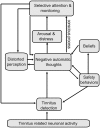A scientific cognitive-behavioral model of tinnitus: novel conceptualizations of tinnitus distress
- PMID: 25339938
- PMCID: PMC4186305
- DOI: 10.3389/fneur.2014.00196
A scientific cognitive-behavioral model of tinnitus: novel conceptualizations of tinnitus distress
Abstract
The importance of psychological factors in tinnitus distress has been formally recognized for almost three decades. The psychological understanding of why tinnitus can be a distressing condition posits that it becomes problematic when it acquires an emotive significance through cognitive processes. Principle therapeutic efforts are directed at reducing or removing the cognitive (and behavioral) obstacles to habituation. Here, the evidence relevant to a new psychological model of tinnitus is critically reviewed. The model posits that patients' interpretations of tinnitus and the changes in behavior that result are given a central role in creating and maintaining distress. The importance of selective attention and the possibility that this leads to distorted perception of tinnitus is highlighted. From this body of evidence, we propose a coherent cognitive-behavioral model of tinnitus distress that is more in keeping with contemporary psychological theories of clinical problems (particularly that of insomnia) and which postulates a number of behavioral processes that are seen as cognitively mediated. This new model provides testable hypotheses to guide future research to unravel the complex mechanisms underpinning tinnitus distress. It is also well suited to define individual symptomatology and to provide a framework for the delivery of cognitive-behavioral therapy.
Keywords: belief; distorted perception; negative thoughts; safety behavior; selective attention; tinnitus.
Figures

Similar articles
-
Bothersome tinnitus : Cognitive behavioral perspectives.HNO. 2018 May;66(5):369-374. doi: 10.1007/s00106-018-0502-9. HNO. 2018. PMID: 29713758 Free PMC article.
-
Evaluation of a Cognitive Behavioral Model of Tinnitus Distress: A Cross-Sectional Study Using Structural Equation Modeling.Ear Hear. 2020 Jul/Aug;41(4):1028-1039. doi: 10.1097/AUD.0000000000000826. Ear Hear. 2020. PMID: 32032227
-
Cognitive behavioural therapy for tinnitus-related insomnia: evaluating a new treatment approach.Int J Audiol. 2019 May;58(5):311-316. doi: 10.1080/14992027.2018.1547927. Epub 2019 Jan 5. Int J Audiol. 2019. PMID: 30612487 Clinical Trial.
-
Tinnitus-related distress: A review of recent findings.Curr Psychiatry Rep. 2011 Feb;13(1):31-6. doi: 10.1007/s11920-010-0163-1. Curr Psychiatry Rep. 2011. PMID: 21080115 Review.
-
Current Validated Medical Treatments for Tinnitus: Cognitive Behavioral Therapy.Otolaryngol Clin North Am. 2020 Aug;53(4):605-615. doi: 10.1016/j.otc.2020.03.007. Epub 2020 Apr 23. Otolaryngol Clin North Am. 2020. PMID: 32334871
Cited by
-
The Relationship of Tinnitus Distress With Personality Traits: A Systematic Review.Front Neurol. 2020 May 29;11:225. doi: 10.3389/fneur.2020.00225. eCollection 2020. Front Neurol. 2020. PMID: 32655464 Free PMC article.
-
Transportation Noise and Risk of Tinnitus: A Nationwide Cohort Study from Denmark.Environ Health Perspect. 2023 Feb;131(2):27001. doi: 10.1289/EHP11248. Epub 2023 Feb 1. Environ Health Perspect. 2023. PMID: 36722980 Free PMC article.
-
Effects of Tinnitus on Cochlear Implant Programming.Trends Hear. 2019 Jan-Dec;23:2331216519836624. doi: 10.1177/2331216519836624. Trends Hear. 2019. PMID: 30880643 Free PMC article.
-
MinT-trial: Mindfulness versus cognitive behavioural therapy in Tinnitus patients: protocol for a randomised controlled, non-inferiority trial.BMJ Open. 2020 Feb 25;10(2):e033210. doi: 10.1136/bmjopen-2019-033210. BMJ Open. 2020. PMID: 32102813 Free PMC article.
-
A Pilot Study of Peripheral Muscle Magnetic Stimulation as Add-on Treatment to Repetitive Transcranial Magnetic Stimulation in Chronic Tinnitus.Front Neurosci. 2018 Feb 20;12:68. doi: 10.3389/fnins.2018.00068. eCollection 2018. Front Neurosci. 2018. PMID: 29515350 Free PMC article.
References
-
- Davis A, El Refaie A. Epidemiology of tinnitus. In: Tyler R, editor. Tinnitus Handbook. San Diego, CA: Singular, Thomson Learning; (2000). p. 1–23
-
- Andersson G. A cognitive-affective theory for tinnitus: experiments and theoretical implications. 7th International Tinnitus Seminar. Freemantle: (2002).
Publication types
LinkOut - more resources
Full Text Sources
Other Literature Sources

